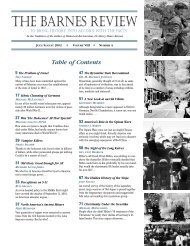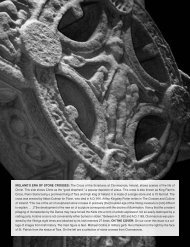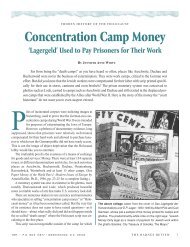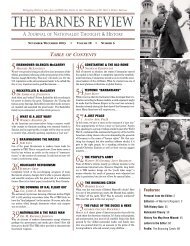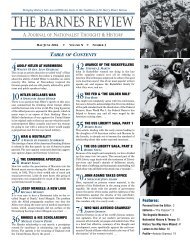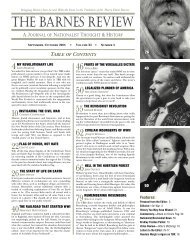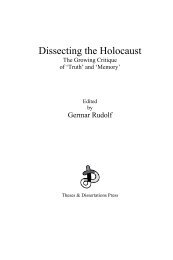You also want an ePaper? Increase the reach of your titles
YUMPU automatically turns print PDFs into web optimized ePapers that Google loves.
PAGE 8 the barnes review MAY/JUNE<br />
God), as if Heaven could not bear that<br />
any spot should be unacquainted with<br />
the wantonness of <strong>The</strong>odora. 23<br />
Antonina, the wife of Belisarius, fares<br />
no better.<br />
Straightway, therefore, she decided<br />
upon being an adulteress from the very<br />
start, but she was very careful to conceal<br />
this business, not because she was<br />
ashamed of her own practices, nor<br />
because she entertained any fear so far<br />
as her husband was concerned (for she<br />
never experienced the slightest feeling<br />
of shame for any action whatsoever and<br />
she had gained complete control of her<br />
husband by means of many tricks of<br />
magic), but because she dreaded the<br />
punishment the empress might inflict. 24<br />
Belisarius, praised in <strong>The</strong> History of the<br />
Wars, does not go unscathed in <strong>The</strong><br />
Anecdota. At one point in the narrative<br />
Belisarius was experiencing the disfavor of<br />
Justinian and was relieved of his command.<br />
<strong>The</strong>odora, returning a favor to<br />
Antonina, made it appear that she had<br />
interceded with Justinian on behalf of<br />
Antonina, restoring Belisarius to a certain<br />
degree. When Belisarius heard the news:<br />
[H]e straightway arose and fell on his<br />
face before the feet of his wife. And<br />
clasping both her knees with either<br />
hand and constantly shifting his tongue<br />
from one of the woman’s ankles to the<br />
other, he kept calling her the cause of<br />
his life and his salvation, and promising<br />
thenceforth to be, not her husband, but<br />
her faithful slave. 25<br />
Procopius does not spare the justice system<br />
from his deftly aimed barbs. During<br />
Justinian’s reign the contention existing<br />
between the factions competing in the hippodrome<br />
spilled over into the daily life of<br />
Constantinople, and soon became nothing<br />
more than unrestrained criminal behavior.<br />
<strong>The</strong> following describes how the judges<br />
handled members of the blue faction 26 who<br />
were arrested and brought before the<br />
court.<br />
[A]nd those who sat in judgment, in<br />
rendering their decisions on the points<br />
in dispute, gave their verdicts, not as<br />
seemed to them just and lawful, but<br />
according as each of the disputants had<br />
hostile or friendly relations with the<br />
factions. 27<br />
Was the history of Procopius a factual<br />
history as well as a secret history? Should<br />
<strong>The</strong> Anecdota be completely disregarded as<br />
the rantings of a frustrated court historian?<br />
<strong>The</strong> Anecdota has proven itself to be<br />
something of a thorn in the side for historians<br />
who find it necessary to employ a cer-<br />
tain amount of rationalization when dealing<br />
with it. Quite often historians, in a<br />
futile attempt to have their cake and eat it<br />
as well, will contradict themselves concerning<br />
<strong>The</strong> Anecdota. <strong>The</strong> following is an ex -<br />
cellent example of the paradoxical ap -<br />
proach historians seem to inevitably adopt<br />
regarding <strong>The</strong> Anecdota.<br />
Untrustworthy as <strong>The</strong> Secret History<br />
may be, it provides a fascinating antidote<br />
to the official panegyrics as well as<br />
a useful glimpse into the dark corridors<br />
of the Great Palace. And even in <strong>The</strong><br />
Secret History, the comments of the man<br />
who has seen the ravages of war have<br />
the ring of truth. 28<br />
In the space of one short paragraph we<br />
see <strong>The</strong> Anecdota being described in terms<br />
as contradictory as “untrustworthy” and<br />
“useful.”<br />
Even a scholar of Edward Gibbon’s eminence<br />
seems to be of two minds concerning<br />
this particular work of Procopius. As<br />
regards Belisarius and Antonina, Gibbon<br />
states the following:<br />
<strong>The</strong> generous reader may cast away<br />
the libel, but the evidence of facts will<br />
adhere to his memory; and he will reluctantly<br />
confess that the fame and even<br />
the virtue of Belisarius were polluted by<br />
the lust and cruelty of his wife, and that<br />
the hero deserved an appellation which<br />
may not drop from the pen of the decent<br />
historian. 29<br />
Of <strong>The</strong> Anecdota in general, we have<br />
this statement of Gibbon’s to ponder:<br />
Of these strange anecdotes, a part<br />
may be true, because probable; and a<br />
part true, because improbable. Proco -<br />
pius must have known the former, and<br />
the latter he could scarcely invent. 30<br />
Yet, when discussing the reason for the<br />
tactics employed by Belisarius in the<br />
Persian theater of war, Gibbon seems less<br />
sure of the reliability of the information<br />
contained in <strong>The</strong> Anecdota. Gibbon says,<br />
“with some slight exceptions, we may reasonably<br />
shut our ears against the malevolent<br />
whisper of the anecdotes.” 31<br />
John Barker describes <strong>The</strong> Anecdota as<br />
“probably the most infamous and scurrilous<br />
piece of sustained character assassination<br />
in all of literature.” 32 Yet Barker<br />
also states that “used with caution and in<br />
careful relation to other materials, even<br />
<strong>The</strong> Secret History is of considerable value<br />
to the historian of Justinian.” 33<br />
Will Durant also formed an opinion concerning<br />
the reliability of <strong>The</strong> Anecdota and,<br />
like Gibbon and Barker, he feels Procopius<br />
is to be trusted when writing on some sub-<br />
jects and distrusted when writing about<br />
other subjects.<br />
It is a fascinating book, like any<br />
denunciation of our neighbors; but<br />
there is something unpleasant in literary<br />
attacks upon persons who can no<br />
longer speak in their own defense. An<br />
historian who strains his pen to prove a<br />
thesis may be trusted to distort the<br />
truth. Procopius was occasionally inaccurate<br />
in matters beyond his own experience;<br />
he copied at times the manner<br />
and philosophy of Herodotus, at times<br />
the speeches and sieges of Thucydides;<br />
he shared the superstitions of his age,<br />
and darkened his pages with portents,<br />
oracles, miracles, and dreams. But<br />
where he wrote of what he had seen, his<br />
account has stood every test. 34<br />
J. Bury as well seems to have struggled<br />
with the question of whether or not <strong>The</strong><br />
Anecdota could be considered as a valid<br />
historical document. Bury states, “the selfdefeating<br />
maliciousness of the whole performance<br />
discredits the work, and has even<br />
suggested doubts whether it could have<br />
been written at all by the sober and responsible<br />
historian of the wars. <strong>The</strong> authorship,<br />
however, is indisputable.” 35 How ever, Bury<br />
tempers this harsh indictment with the following<br />
words.<br />
... [W]e must carefully distinguish<br />
between the facts which the author<br />
records, and the interpretation which<br />
he places upon them. Malice need not<br />
resort to invention. It can serve its purpose<br />
far more successfully by adhering<br />
to facts, misrepresenting motives, and<br />
suppressing circumstances which point<br />
to a different interpretation. That this<br />
was the method followed by Procopius<br />
is certain. For we find that in a large<br />
number of cases his facts are borne out<br />
by other contemporary sources, while<br />
in no instance can we convict him of a<br />
statement which has no basis in fact. 36<br />
Procopius himself seems to have foreseen<br />
the scholastic shock waves that <strong>The</strong><br />
Anecdota was sure to generate. He presents<br />
an able defense of his work in the<br />
opening pages.<br />
[I]t was not possible, as long as the<br />
actors were still alive, for these things<br />
to be recorded in the way they should<br />
have been. For neither was it possible to<br />
elude the vigilance of multitudes of<br />
spies, nor, if detected, to escape a most<br />
cruel death. ... I find myself stammering<br />
and shrinking as far from it as possible,<br />
as I weigh the chances that such things<br />
are now to be written by me as will seem<br />
neither credible nor probable to men of<br />
a later generation; and especially when<br />
the mighty stream of time renders the<br />
story somewhat ancient, I fear lest I<br />
shall earn the reputation of being even<br />
a narrator of myths and shall be ranked



